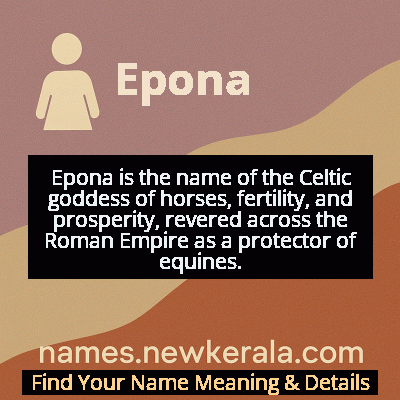Epona Name Meaning & Details
Origin, Popularity, Numerology Analysis & Name Meaning of Epona
Discover the origin, meaning, and cultural significance of the name EPONA. Delve into its historical roots and explore the lasting impact it has had on communities and traditions.
Name
Epona
Gender
Female
Origin
Celtic
Lucky Number
6
Meaning of the Name - Epona
Epona is the name of the Celtic goddess of horses, fertility, and prosperity, revered across the Roman Empire as a protector of equines.
Epona - Complete Numerology Analysis
Your Numerology Number
Based on Pythagorean Numerology System
Ruling Planet
Venus
Positive Nature
Harmonious, responsible, caring, and artistic.
Negative Traits
Overly idealistic, superficial, possessive, or jealous.
Lucky Colours
Pink, turquoise.
Lucky Days
Friday.
Lucky Stones
Diamond, turquoise.
Harmony Numbers
2, 3, 9.
Best Suited Professions
Artists, musicians, teachers, healthcare workers.
What People Like About You
Warmth, nurturing nature, artistic flair.
Famous People Named Epona
Epona (Mythological)
Celtic Goddess
Primary horse deity worshipped across the Roman Empire, protector of horses and cavalry
Epona (Literary Character)
Fictional Character
Featured in various fantasy novels and series as a powerful equine-associated character
Epona (Gaming Reference)
Video Game Character
Legend of Zelda series - Link's loyal horse companion appearing in multiple installments
Name Variations & International Equivalents
Click on blue names to explore their detailed meanings. Gray names with will be available soon.
Cultural & Historical Significance
Extended Personality Analysis
Those bearing the name Epona often embody a remarkable blend of strength and compassion, reflecting their namesake's dual nature as both protector and nurturer. They typically exhibit strong leadership qualities combined with deep empathy, making them natural caregivers who can also take charge in challenging situations. Epona-named individuals frequently demonstrate exceptional loyalty and reliability—once they commit to a person or cause, they remain steadfast through difficulties. Their connection to horse symbolism often manifests as a love for freedom and movement, whether through physical travel, intellectual exploration, or spiritual journeys. Many develop strong bonds with animals and nature, showing particular affinity for horses or environmental causes. These individuals often possess an intuitive understanding of balance—knowing when to be gentle and when to be firm, when to lead and when to follow. Their adventurous spirit is typically tempered by practical wisdom, making them both dreamers and doers. The mythological heritage of their name often inspires a sense of purpose and connection to history, with many Eponas developing interests in cultural preservation, storytelling, or community building.
Modern Usage & Popularity
In contemporary naming practices, Epona occupies a unique niche as a mythological name that has gained recognition through popular culture while maintaining its distinctive character. The name saw increased awareness following the 1998 release of The Legend of Zelda: Ocarina of Time, where Epona appears as Link's faithful horse companion. Despite this exposure, the name remains rare in birth registries, appealing primarily to parents seeking meaningful, historically rich names outside mainstream trends. Current usage trends show it's most popular among families with Celtic heritage, mythology enthusiasts, and those involved in equestrian activities. The name's strength lies in its combination of feminine sound with powerful associations—it feels both ancient and fresh, specific yet versatile. Social media and online parenting communities have helped sustain interest in the name, with many parents appreciating its strong female associations and natural elements. While not likely to become a top-ranking name, Epona continues to attract parents looking for names with depth, character, and cultural significance that stands out without being overly exotic.
Symbolic & Spiritual Meanings
Epona's symbolic resonance extends far beyond her literal association with horses, representing profound concepts of journey, protection, and the sacred bonds between species. As a goddess who ensured safe travel, she symbolizes not just physical movement but spiritual progression and life transitions. Her presence in both Celtic and Roman contexts makes her an emblem of cultural exchange and adaptation—the ability to maintain core identity while embracing new environments. The horse symbolism connects to themes of power, freedom, and untamed nature, while her maternal aspects represent nurturing, sustenance, and the cycles of life. Modern interpretations often see Epona as an environmental symbol, representing humanity's responsibility toward animals and the natural world. She embodies the concept of 'sacred stewardship'—the idea that strength and protection should be exercised with compassion and wisdom. In psychological terms, Epona can represent the integration of wild instincts with civilized behavior, the balance between independence and community, and the journey toward self-mastery. Her enduring appeal across millennia speaks to universal human needs for protection in travel, connection to nature, and the preservation of cultural memory through powerful symbolic figures.

